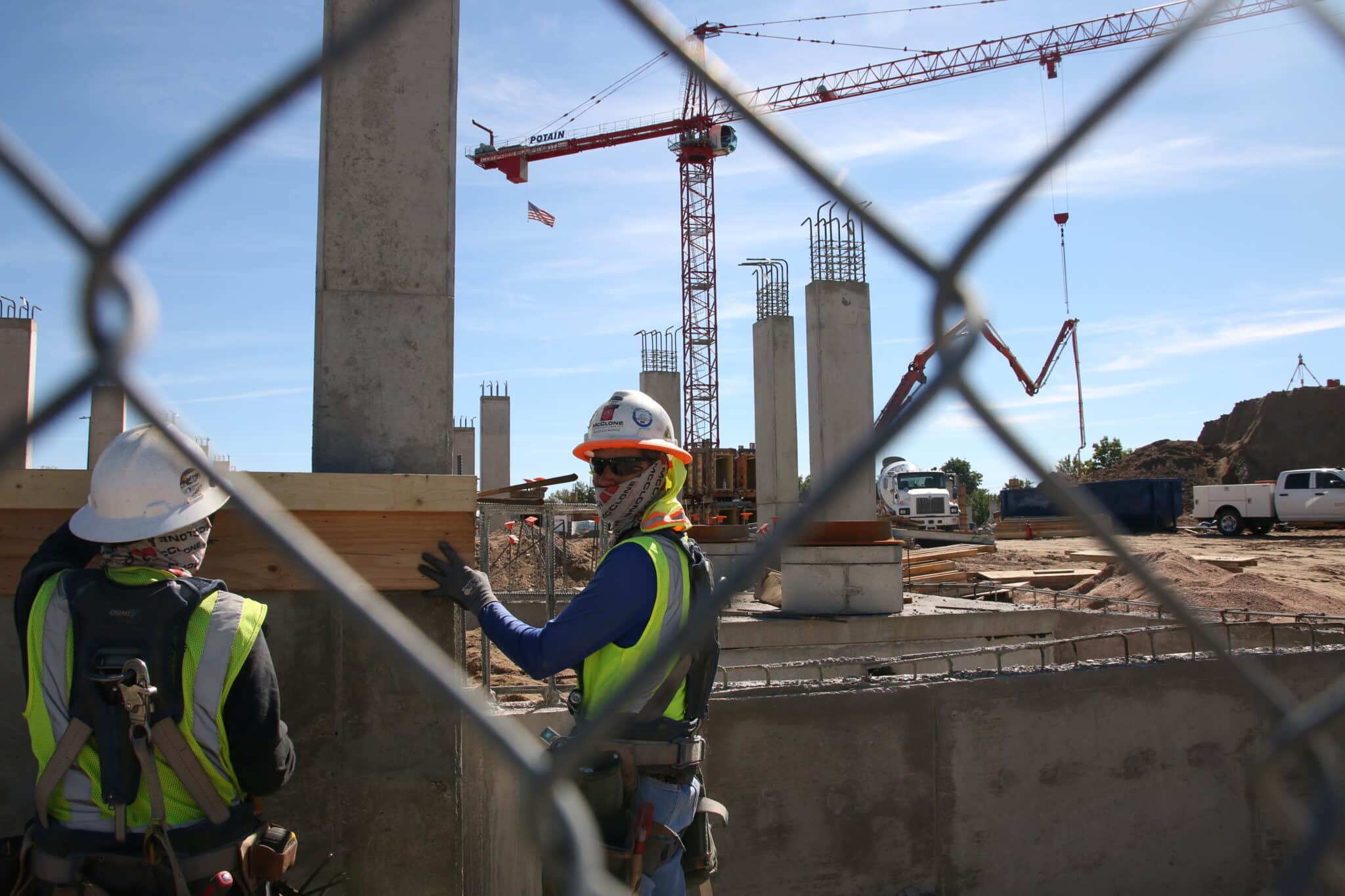
A crew works on an apartment complex under construction at 2141 S. Broadway in September 2021. (BusinessDen file)
Projects looking to be exempted from Denver’s new requirements regarding income-restricted housing now have more breathing room.
The Denver City Council voted 12-1 Monday evening to effectively push back the date by which project plans must be approved by an entire year. Councilwoman Candi CdeBaca was the sole vote in dissent.
Denver’s “Expanding Housing Affordability” ordinance, which went into effect July 1 last year, requires those constructing residential buildings in the city to incorporate a varying amount of income-restricted units, or to pay a fee of at least $250,000 for each missing unit. Developers building a non-residential project, like a warehouse or office building, must pay an increased linkage fee.
The change approved Monday pertains to projects for which development plans were submitted to the city by June 30, 2022.
Previously, projects seeking to be grandfathered in from the new rules had to have their site development plan approved by the city by Aug. 31, 2023.
But the large number of plans submitted, as well as city staffing challenges, led developers to worry they might miss that deadline for reasons out of their control.
Under the change approved Monday, plans now need to be approved by May 17, 2024. By projects that have received three rounds of comments by that date are given additional time to win final approval — until Aug. 31, 2024.
Laura Swartz, spokeswoman for Denver Community Planning and Development, which reviews plans, told BusinessDen in April the pushed-back deadline was in line with the “original spirit” of the ordinance, because the goal was always to give developers a reasonable time period to wrap up plans already in the works.
“We really feel like this is a fair resolution to the difficult situation our customers have been in,” Swartz said at the time.

Nicholas Halstead
Nicholas Halstead, Colorado managing director of development for Dallas-based Mill Creek Residential, which builds apartment complexes, spoke in support of the extension at the Monday meeting.
“A predictable entitlement process … is of utmost importance to investors and developers as they contemplate how to make major investment decisions that drive housing and other major projects forward,” Halstead said.
Halstead said reviews his firm previously saw take nine to 12 months are now taking upwards of 18 months. He said the company is seeing more rounds of comments on its proposals — with the period between rounds sometimes taking up to 16 weeks.
A Mill Creek project in the works in University Park is 18 months into the review process and on its seventh round of site development plan comments, Halstead said. Another in RiNo is on its second round 15 months after the initial submittal.
“Without this extension, there’s absolutely no way this project would move forward,” Halstead said of the RiNo project.
Councilman Chris Hinds said some of his constituents had asked him to vote against the extension and questioned whether reviews were taking longer because some developers knowingly submitted “less than quality” plans.
“I think people just threw stuff against the wall just in case,” he said.
Chris Gleissner, a Community Planning and Development staffer, said he believed that did happen, but that not all plans taking a long time to review should be seen that way.
“I’m absolutely certain that’s the case that folks threw some junk against the wall,” Gleissner said. “I’m absolutely certain that folks turned in good quality submittals that just didn’t necessarily hit all the boxes.”

Candi CdeBaca
Hinds voted in favor of the extension, but said he would be unlikely to support another one.
CdeBaca, meanwhile, asked city staff to confirm that, if the deadline were not extended, affected projects would have to be built in accordance with the new regulations.
“They would just have to reapply under the new rules, and create the housing that we’re asking for?” CdeBaca said.
“I don’t think it’s quite as simple as that, but yes … The projects were likely financed under certain assumptions that would now be different,” responded Jill Jenning Golich, deputy director of Community Planning and Development.
As part of Monday’s changes, a small number of projects subject to additional subdivision or large-development review now have their final deadline pushed back from Dec. 31 of this year to as late as Dec. 21, 2024.

A crew works on an apartment complex under construction at 2141 S. Broadway in September 2021. (BusinessDen file)
Projects looking to be exempted from Denver’s new requirements regarding income-restricted housing now have more breathing room.
The Denver City Council voted 12-1 Monday evening to effectively push back the date by which project plans must be approved by an entire year. Councilwoman Candi CdeBaca was the sole vote in dissent.
Denver’s “Expanding Housing Affordability” ordinance, which went into effect July 1 last year, requires those constructing residential buildings in the city to incorporate a varying amount of income-restricted units, or to pay a fee of at least $250,000 for each missing unit. Developers building a non-residential project, like a warehouse or office building, must pay an increased linkage fee.
The change approved Monday pertains to projects for which development plans were submitted to the city by June 30, 2022.
Previously, projects seeking to be grandfathered in from the new rules had to have their site development plan approved by the city by Aug. 31, 2023.
But the large number of plans submitted, as well as city staffing challenges, led developers to worry they might miss that deadline for reasons out of their control.
Under the change approved Monday, plans now need to be approved by May 17, 2024. By projects that have received three rounds of comments by that date are given additional time to win final approval — until Aug. 31, 2024.
Laura Swartz, spokeswoman for Denver Community Planning and Development, which reviews plans, told BusinessDen in April the pushed-back deadline was in line with the “original spirit” of the ordinance, because the goal was always to give developers a reasonable time period to wrap up plans already in the works.
“We really feel like this is a fair resolution to the difficult situation our customers have been in,” Swartz said at the time.

Nicholas Halstead
Nicholas Halstead, Colorado managing director of development for Dallas-based Mill Creek Residential, which builds apartment complexes, spoke in support of the extension at the Monday meeting.
“A predictable entitlement process … is of utmost importance to investors and developers as they contemplate how to make major investment decisions that drive housing and other major projects forward,” Halstead said.
Halstead said reviews his firm previously saw take nine to 12 months are now taking upwards of 18 months. He said the company is seeing more rounds of comments on its proposals — with the period between rounds sometimes taking up to 16 weeks.
A Mill Creek project in the works in University Park is 18 months into the review process and on its seventh round of site development plan comments, Halstead said. Another in RiNo is on its second round 15 months after the initial submittal.
“Without this extension, there’s absolutely no way this project would move forward,” Halstead said of the RiNo project.
Councilman Chris Hinds said some of his constituents had asked him to vote against the extension and questioned whether reviews were taking longer because some developers knowingly submitted “less than quality” plans.
“I think people just threw stuff against the wall just in case,” he said.
Chris Gleissner, a Community Planning and Development staffer, said he believed that did happen, but that not all plans taking a long time to review should be seen that way.
“I’m absolutely certain that’s the case that folks threw some junk against the wall,” Gleissner said. “I’m absolutely certain that folks turned in good quality submittals that just didn’t necessarily hit all the boxes.”

Candi CdeBaca
Hinds voted in favor of the extension, but said he would be unlikely to support another one.
CdeBaca, meanwhile, asked city staff to confirm that, if the deadline were not extended, affected projects would have to be built in accordance with the new regulations.
“They would just have to reapply under the new rules, and create the housing that we’re asking for?” CdeBaca said.
“I don’t think it’s quite as simple as that, but yes … The projects were likely financed under certain assumptions that would now be different,” responded Jill Jenning Golich, deputy director of Community Planning and Development.
As part of Monday’s changes, a small number of projects subject to additional subdivision or large-development review now have their final deadline pushed back from Dec. 31 of this year to as late as Dec. 21, 2024.


